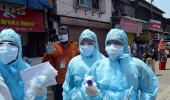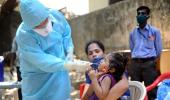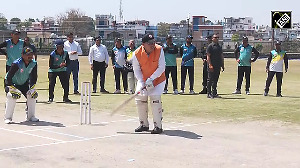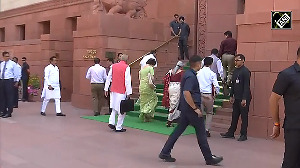'They are doing a good surveillance job.'
'It is not easy to undertake this task on such a huge scale given the risks.'
'But home quarantine is not effective.'
'Only institutional quarantine can bring good results.'

Contrary to media reports that the inter ministerial central team (IMCT) the Union government assigned to assess Maharashtra's preparedness to contain the spread of coronavirus has suggested specific recommendations to improve its health infrastructure, state Health Minister Rajesh Tope says the IMCT is likely to finalise its recommendations, if any, by Thursday evening and submit it to the Centre and state administrations.
An IMCT member confirms to Rediff.com's Prasanna D Zore that the five-member team headed by Additional Secretary Manoj Joshi has not yet made any recommendations.
IMCT members will meeting later in the day to finalise their report which will be submitted to the central government.
"The IMCT may not have anything to recommend because we have been doing a good job in the state," Tope tells Prasanna. "They may not suggest any recommendations."
"They are satisfied with the state government's preparedness. They have to be satisfied," he said.
Tope says the IMCT team suggested that the number of people under institutional quarantine be tripled in Dharavi, Mumbai's largest slum colony with an estimated population of 750,000 people.
"I was with them (IMCT) in Dharavi yesterday (April 22) and they suggested we increase the number of institutional quarantine. I think that is a valid suggestion and we are doing that," the minister tells Rediff.com.
"I immediately rang up BMC (Brihanmumbai Municipal Corporation) Commissioner Pravin Pardeshi and asked him to arrange for more schools where people can be moved from home quarantine to institutional quarantine," reveals Tope.
"The home quarantine procedure adopted by the BMC is wrong. At least for Dharavi that is wrong."
Tope has asked the BMC to increase as many institutional quarantine facilities as possible even by constructing sheds on playgrounds of schools in Dharavi.
"I have asked the BMC commissioner to increase the number of institutional quarantine beds to 2,000 from the existing 650," Tope says.
"Home quarantine cannot be a solution to contain the spread of COVID-19 especially in a densely populated locality like Dharavi where 10 to 15 people live in one room."
"How is social distancing possible with so many people in a 100 square feet tenement?" the minister asks.
"I have spoken with the chief secretary (Ajoy Mehta) yesterday night and I am sure in the next few days the situation in Dharavi will improve to a large extent."
Praising the BMC and its health workers who are in the midst of screening almost the entire population of Dharavi since last week, Tope says "They are doing a good surveillance job. It is not easy to undertake this task on such a huge scale given the risks. But home quarantine is not effective. Only institutional quarantine can bring good results."
"Barring Mumbai, which has its own complexities and challenges, we are satisfied that we have been successful in lowering the mortality rate and increasing the number of days in which COVID-19 positive patients are doubling."











 © 2025
© 2025